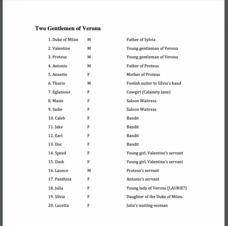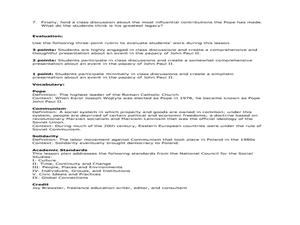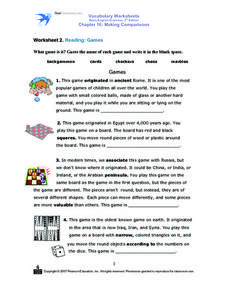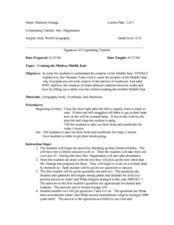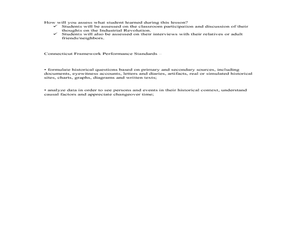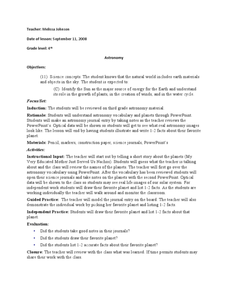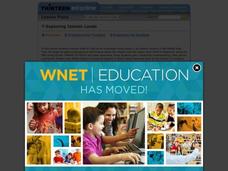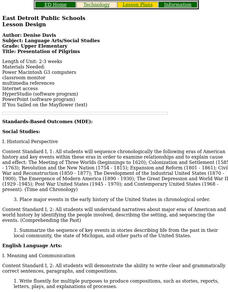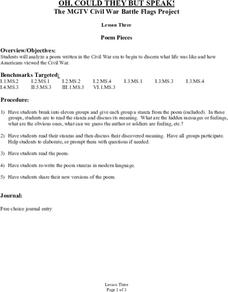Orlando Shakes
Two Gentlemen of Verona
What teenager can't relate to the drama of a love triangle? Scholars put their literary skills to use in a gripping role-play drama. William Shakespeare's Two Gentlemen of Verona unfolds as the classroom becomes a stage of...
Curated OER
Pope John Paul II: Triumph Over Communism
Young scholars discover the background of Pope John Paul II. In this modern history lesson, students research the life of Karol Joseph Wojtyla (Pope John Paul II) in order to understand how his past paralleled his papacy.
Curated OER
Reading: Games
In this games worksheet, students read the names of 5 common games. Students then read 5 paragraphs that describe the origin of a game. Students guess the name of each game and write it in the blank space.
Curated OER
The Ancient Maya
Students explore the culture of the Mayans through a variety of activities. In this lesson about Maya, students analyze pictures in books and on websites, produce scale models of Maya architecture, and create Maya mosaics. Students study...
Curated OER
Alexander the Great
In this online interactive history worksheet, students respond to 10 short answer and essay questions about the achievements of Alexander the Great. Students may check some of their answers on the interactive worksheet.
Curated OER
Creating the Modern Middle East
Young scholars examine the creation of the Middle East and how the Ottoman Turks attempted to unite the peoples of the Middle East. They discuss why European powers took control of the nations in southwest Asia and how the creation of...
Curated OER
What do we know about Iraq?
High schoolers develop viewpoints on world issues and concerns. Students review facts on historical time periods. High schoolers compare past happenings to present situations in history. Students differentiate between various forms of...
Curated OER
State of Mind: Inventing the American Identity
Students define national identity, explain importance of having national identity, describe America's national identity, work together and formulate class vision of what America's national identity is, identify United States symbols and...
Curated OER
Initiation – Industrial Revolution
Sixth graders examine historical artifacts. In this Industrial Revolution lesson, 6th graders discover how modern conveniences are connected to innovations of the Industrial Revolution era. Students interview adults about technological...
Curated OER
Astronomy
Students complete a series of activities to better understand space studies. In this space science lesson, the teacher is provided with a number of activities for students to complete such as finding words that begin with the prefix...
Curated OER
Edible Coal Mining
Learners explore the concept of bituminous coal and the role it plays within our world. In this economic and earth science activity, young scholars discover and model the extraction methods with hands-on activities. Learners...
Curated OER
God's Creation
Second graders explore religion by analyzing the state of the country. In this American creation lesson, 2nd graders read that God created the world and therefore the United States and all of the beautiful things within the country....
Curated OER
Cargoes from Three Continents Ancient Mediterranean Trade
Sixth graders begin the lesson by researching the different types of ships and shipbuilding techniques used to help trade in the Mediterranean Sea. Using different objects, they determine what one can tell about a society and discuss...
Curated OER
Islam and Judaism: From Muhammad to the Ottoman Empire
Students examine the interrelationships between Judaism and Islam. They view and discuss the "Heritage: Civilization and the Jews" DVD-ROM, conduct Internet research, complete handouts, and develop a research presentation.
Curated OER
Exploring Islamic Lands
Young scholars examine the lives of Islamic teens. In this global studies activity, students explore selected Internet sites to discover the attributes of Islam, the cultural traditions of Islam, and information regarding Middle Eastern...
Curated OER
Olympic Mascot Lesson
Students investigate the 1968 Olympics by identifying their mascots. In this Olympic history lesson, students participate in a group activity where they match countries with their representative mascots. Students analyze the...
Curated OER
Explaining a Legend
Students explain the place of the legend of Herakles in ancient Greek life and compare ancient and modern legends in an essay.
Curated OER
Killing Fields
Students view a television program that explores people's perceptions and expectations in war prior to and after WWI. They discuss the effects of trench warfare and write a journal entry or short oral report reflecting on their...
Curated OER
Lost Creek- Sacred Landscapes
Eighth graders engage in the discovery of the meaning of Sacred Landscapes. The religious concept is researched for its impact upon the practices of Native Americans and the geographical regions. They write reflection papers upon the...
Curated OER
Presentation of Pilgrims
Students are given a category to research (clothes, life before the New World, the voyage, etc.) about Pilgrim life. s Students, in groups, create presentations using software program such as PowerPoint.
Curated OER
Women in Baseball:Talk Show
Students explore the development of women's baseball during the 20th century. They "role play" women who participated in some form of baseball (amateur, semi-professional, or professional) as well as other advocates of women's sports as...
Curated OER
Lesson Three: Poem Pieces
Students read and analyze stanzas of Civil War poem, The Flags of Michigan, to get perspective on what life was like and how Americans viewed Civil War, rewrite stanzas in modern language, and share new versions of poem with classmates.
Curated OER
Do we Really Need Wild Nature
Students research challenges with which modern biotechnology confronts wild nature. Students collect articles that relate to biotechnology and the environment. Students prepare a collaborative answer to the question, "Do we really need...
Curated OER
AT YOUR FINGERTIPS
The student will locate countries on a world map from which we import foods that our climate prevents us from growing locally.1. Discuss the term "export." Divide pupils into groups of four. Give the groups
five minutes to brainstorm...
